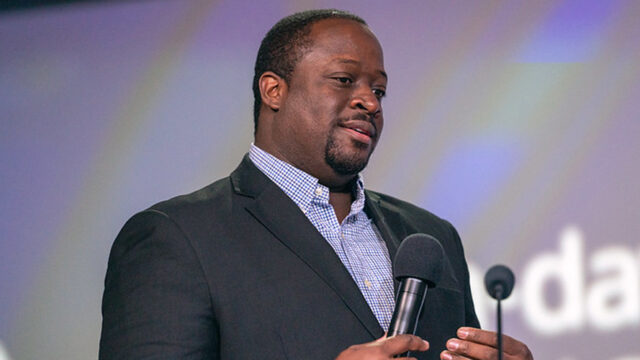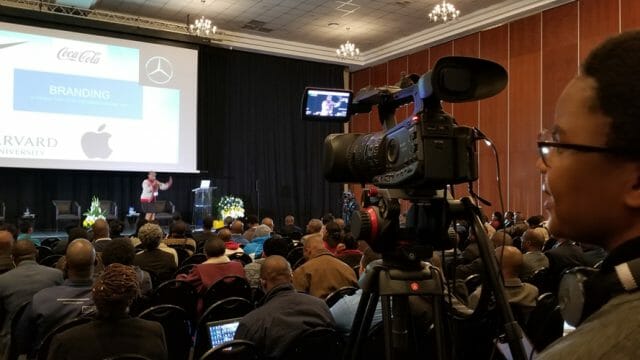Evangelist discusses how to leverage new technologies to reach others for Christ.

Artificial Intelligence (AI) has provided new opportunities for pastoral ministry and evangelistic outreach. Information can be gathered and evaluated quickly. Research on complex topics is at our fingertips. Sermons, books, and articles can be translated into multiple languages almost instantaneously.
AI can even write our sermons and preach them via an avatar. Currently, I am preparing a new series on the prophecies of Daniel, and we are preparing some amazing, up-to-date graphics using AI. Our Hope Lives 365 media team also uses AI to illustrate my Sabbath sermons with outstanding results. AI can be a remarkable asset in the church’s ministry, yet there are some significant challenges and dangers.
Understanding the Dangers and Overcoming Challenges
For some, AI can become a quick fix to sermon preparation rather than the thoughtful, prayerful study of God’s Word. There are also ethical concerns of using AI to produce material and then claiming originality. Transparency here is vital.
One of the major challenges that I see with AI and all digital technology is the potential for substituting technology for the moving of the Spirit and personal relationships. It is possible to spend hours in digital ministry and neglect personal relationships. One can become enamored with the potential viewing audience and focus on programming rather than people. Digital media and AI do not take the place of personal relationships. They are the doorway to more meaningful relationships. They enlarge the circle of your influence from a very few to tens of thousands.
It is also possible to focus on what is trending on social media rather than faithfulness to biblical truth. God has not called us to be trendsetters, He has called us to be proclaimers of the eternal gospel to prepare people for eternity. Digital media is a tool to reach millions, not an end in itself. It is a channel for discipleship. God has not called us to be relevant; He has called us to be effective.
To be effective in a social media ministry it is of paramount importance to begin with the end in mind. The goal is reaching people with the unchangeable, inspired truths of God’s Word. The goal is not contemporary programming; it is effective discipleship and evangelism. The ultimate question is not how many people viewed a program but how many have become disciples of Christ through the digital ministry. Unless the regular viewers who are subscribers to our YouTube channels are transformed by the grace of God and become followers of Christ, we accomplish little. It’s not the number of Facebook friends that really counts; it is the number of friends we make for Jesus. Our X social media account may reach thousands, but unless it touches one life for the gospel, it is making little real difference.
A New Vision Brings New Possibilities
I am intrigued with the following statement by Ellen White: “Truth will be made so prominent that he who runs may read. Means will be devised to reach hearts. Some of the methods used in this work will be different from the methods used in the work in the past; but let no one, because of this, block the way by criticism” (Review and Herald, Sept. 30, 1902).
Certainly, the use of digital technology to “make disciples” and evangelize the world is a “different” method from those used in the past. I am convinced that through a wide variety of online methodologies, the truth will be made “prominent.”
Digital technology provides seeking people surfing the internet an opportunity to discover relevant Christ-centered messages of biblical truth that meet their innermost needs. In the privacy of their homes, they can remain anonymous as they search for deeper meaning and purpose in their life. If the church fails to occupy the digital space and provide answers to these seekers, the space will be filled with godless content focused on dialectic materialism and secular values.
For many people, the internet is no more than a pond of pleasure and a cesspool of vice. There is no doubt that the uncertainty of our times has produced a seeking generation looking for answers to the basic questions of life.
A Seeking Generation
People everywhere are asking, “What is really going on in our world?” Deep within the fabric of their beings they sense that ours is a world in deep trouble — a world consumed with poverty, famine, and war; a world writhing in sickness, disease, and sorrow. Rising from our troubled planet like an incense of doom are the cries of millions of people, “What does the future hold? Are we a forgotten cinder out on the edge of a forgotten galaxy — a world that doesn’t matter?”
Secularism, materialism, and the pursuit of pleasure have let them down. Their hearts are empty. There is a deep longing within for something to satisfy the deepest needs of the soul. The disciples of Christ had a purpose to live for and something to die for. Their lives were caught up in the all-consuming mission of leading people to become disciples of Christ. The proclamation of the gospel was their passion. They recognized that the deepest need of the human heart is to know Christ. When their passion is our passion, we, too, will be consumed with reaching lost people. Our desire will be to use every method possible to make disciples for Christ.
Mission Possible
Mission impossible is now mission possible. God has allowed some of the greatest minds of this generation to develop technology for the communication of His Word locally and globally. Through His divine providence, the “fulness of time has come” to proclaim His last-day message of eternal truth in every means possible. The opportunity is ours to embrace. The moment is ours to seize. The digital door is open for us to enter. By the grace of God let us grasp the significance of the possibilities before us.
The original version of this commentary was posted in the Adventist-Laymen’s Services and Industries November 2024 newsletter. Adventist-Laymen’s Services and Industries is a nonprofit supporting ministry and is not operated by the corporate Seventh-day Adventist Church.








